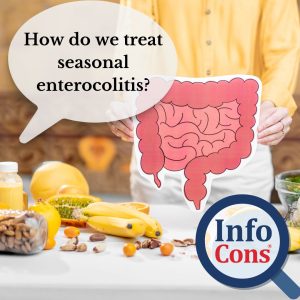Seasonal enterocolitis is a common condition during the summer and autumn months when high temperatures and the consumption of perishable foods increase the risk of gastrointestinal infections. This condition, characterized by inflammation of the intestinal mucosa, can be caused by bacteria, viruses, or parasites. Effective treatment of seasonal enterocolitis involves both medical measures and preventing recurrence.
Symptoms of Enterocolitis
The symptoms of enterocolitis can vary depending on the pathogen, but the most common include:
Diarrhea
Abdominal pain
Nausea and vomiting
Fever
Fatigue and dehydration
Causes of Seasonal Enterocolitis
Seasonal enterocolitis is often caused by:
Bacteria: Salmonella, Escherichia coli, Shigella, Campylobacter.
Viruses: Rotavirus, Norovirus, Adenovirus.
Parasites: Giardia lamblia, Entamoeba histolytica.
These microorganisms can be transmitted through the consumption of contaminated food or water, direct contact with infected persons, or poor hygiene.
Treatment of Enterocolitis
The treatment of seasonal enterocolitis depends on the severity of the symptoms and the pathogen involved. Here are some essential measures:
Rehydration:
This is crucial to combat dehydration caused by diarrhea and vomiting. Oral rehydration solutions (ORS) containing essential salts and electrolytes are recommended.
In severe cases, intravenous rehydration may be necessary in a hospital setting.
Diet:
For the first 24-48 hours, a light diet based on bland and easily digestible foods such as boiled rice, bananas, toast, and clear soup is recommended.
Avoid fatty, fried, spicy foods, and dairy products until symptoms improve.
Medication:
Antibiotics: Used only if the enterocolitis is caused by a confirmed bacterial infection. Self-medication with antibiotics is discouraged as it can worsen symptoms and lead to bacterial resistance.
Probiotics: Probiotic supplements can help restore the balance of intestinal flora.
Antispasmodics and analgesics: These can be used to relieve abdominal pain.
Rest:
Adequate rest helps the body recover faster and fight off the infection.
Prevention of Seasonal Enterocolitis
Prevention is key to avoiding seasonal enterocolitis. Here are some useful tips:
Food hygiene: Properly wash fruits and vegetables, cook meat adequately, and avoid consuming unsafe water or food.
Personal hygiene: Wash hands with soap and water before eating and after using the toilet.
Avoid self-medication: Do not take medications without consulting a doctor.
Vaccination: For certain types of viral enterocolitis, such as rotavirus, vaccination can provide effective protection, especially in young children.
Seasonal enterocolitis can be troublesome, but by adopting appropriate preventive measures and treatments, symptoms can be effectively managed. Consulting a doctor for an accurate diagnosis and a personalized treatment plan is essential for a quick recovery and prevention of complications.
Read also: How to Get Rid of Stomach Burns
Why Are We More Prone to Enterocolitis While on Vacation?
Vacations are times for relaxation and exploration, but unfortunately, they sometimes come with an increased risk of enterocolitis. There are several reasons why we are more prone to this condition when we are on vacation:
Change in Diet and Eating Habits:
On vacation, many people tend to change their diet and try new foods. This change can lead to the consumption of foods that are not typical for the digestive system, which can cause intestinal irritation and infections. Additionally, foods and drinks consumed on vacation may be prepared and stored in conditions that are not as strict as at home.
Consumption of Unsafe Water:
In some tourist destinations, tap water is not safe for consumption. Even the water used for ice, washing fruits and vegetables, or preparing food can be contaminated. Drinking contaminated water is one of the main causes of enterocolitis.
Reduced Personal Hygiene:
Traveling often involves limited access to adequate hygiene facilities. Hand washing before meals or after using the toilet can be neglected, increasing the risk of transmitting bacteria and viruses that cause enterocolitis.
Consumption of Street Food:
Street food, though often delicious and authentic, may be prepared and stored in conditions that do not meet hygiene standards. Contamination with bacteria, parasites, or viruses is more likely with street food, especially in regions with poor sanitation infrastructure.
Warm and Humid Climate:
Vacation destinations with a warm and humid climate provide an environment conducive to the rapid multiplication of bacteria and other pathogens. High temperatures accelerate food spoilage, increasing the risk of food poisoning and enterocolitis.
Exposure to New Pathogens:
International travel exposes tourists to bacteria, viruses, and parasites to which their immune system is not accustomed. These pathogens can cause intestinal infections and enterocolitis because the body has no pre-existing immunity against them.
Change in Routine and Daily Habits:
Changes in time zones, fatigue, stress, and a change in daily routine can weaken the immune system, making us more vulnerable to infections. Additionally, consuming different foods and drinks at unusual times can negatively affect digestion.
How to Prevent Enterocolitis While on Vacation?
To reduce the risk of enterocolitis on vacation, the following preventive measures are essential:
Consume bottled water: Use bottled water for drinking and brushing your teeth.
Avoid ice: Ice may be made from contaminated water, so it is safer to avoid it.
Eat well-cooked foods: Ensure that foods are properly cooked and are hot when served.
Strict hygiene: Wash hands frequently with soap and water, especially before meals and after using the toilet.
Avoid raw foods: Raw fruits and vegetables should be well washed or peeled. Avoid raw salads and unprepared fruits.
Probiotics: Consider probiotic supplements to help maintain a healthy balance of intestinal flora.
Avoid self-medication: Consult a doctor before taking any medications for gastrointestinal symptoms.
Vacations should be times of joy and relaxation. By adopting these preventive measures, the risk of enterocolitis can be significantly reduced, allowing you to fully enjoy your vacation time.
Source: WHO
